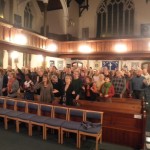 Why Church Isn’t Optional for Christians – Adapted from True Worshipers, by Bob Kauflin – original source here.
Why Church Isn’t Optional for Christians – Adapted from True Worshipers, by Bob Kauflin – original source here.
I recently heard a pastor of a large American church say matter-of-factly that the average person in his church attended one out of three Sundays. Sadly, he wasn’t saying it was a problem. He was simply making an observation.
It’s an observation that stands in stark contrast to the admonition in Hebrews 10:24-25: “And let us consider how to stir up one another to love and good works, not neglecting to meet together, as is the habit of some, but encouraging one another, and all the more as you see the Day drawing near.”
If going to church is an item we check off our list every week, if we regularly look for excuses to skip out, if the Sunday gathering is more of an obligation than a joy, then perhaps we’ve forgotten why God thinks it’s so important.
As a reminder, let me suggest eight reasons gathering with God’s people each week is meant to be the high point of our week.
1. Jesus came to save a people, not random individuals.
From the days of Adam and Eve, God wanted a people who would declare the greatness of his name through the words and witness of their life together. God never intended our worship to be just “me and God.” That’s because our worship is the outflow of the relationships the Father, Son, and Spirit have always enjoyed.
Throughout the Old Testament God calls his people together to celebrate his goodness and renew his covenant with them (Exodus 19:6; Exodus 23:14-17). In the New Testament, Paul declares that the church is “the temple of the living God” (2 Corinthians 6:16). Elsewhere he refers to us as “God’s field, God’s building” (1 Corinthians 3:9).
Bottom line: God doesn’t give us a choice about whether we want to be in the church. If we’re Christians, we’re already part of the family. The question now is where and how we work out the details of family life.
2. We need to rehearse and be reminded of the gospel.
Robert Robinson confessed in his hymn “Come Thou Fount of Every Blessing” that he was “prone to wander.” There’s nothing we’re more prone to wander from than our reliance on the gospel — the amazing news that Jesus has come to bear our sins, endure the punishment we deserved, and reconcile us to God.
This is of “first importance” and is meant to dwell in us richly as we meet (1 Corinthians 15:1-4; Colossians 3:16). But we tend to wander from that news when we neglect to meet with the church. We meet together as redeemed saints to remind each other whose we are, how we got here, and why it matters.
3. God’s Word builds us together.
When the church gathers expectantly in one place at one time to hear God’s Word proclaimed, it’s a unique event. God himself addresses us as his people. The Spirit works in our hearts at once to convict, comfort, illumine, and exhort (1 Thessalonians 1:4-5, 2:13).
Not only are we being strengthened individually; we’re being strengthened as a body. We can thank God for opportunities to listen to downloaded messages on our own. We can thank him even more that we get to hear them with the church.
4. We were made to serve and care for one another.
The writer of Hebrews tells us we gather “to stir up one another to love and good works” (Hebrews 10:24). I’m stirred up as I benefit from the different strengths, gifts, and abilities God has given to other members of my church. I need to be stirred up regularly. So do you.
In addition, each of us has been gifted in some way to serve our local church (1 Corinthians 12:4-7; 1 Peter 4:10). Of course that serving can and should take place outside Sunday mornings. But when we don’t meet together, we limit the opportunities we have to serve each other.
5. We become more aware of God’s presence.
We don’t have to scour the Internet to locate the latest outpouring of the Spirit. We don’t have to chase experiences and manifestations of the Holy Spirit “out there” — because he’s already promised to be “right here” as we meet with our local church.
As the new temple in Jesus Christ (Ephesians 2:19-22), the church is where God’s presence is now typically encountered. Why would we want to miss out on it?
6. We demonstrate our unity in the gospel.
The scattered church throughout the week is still the church. But gathering together is a physical demonstration and reminder of our distinctness from the world and our unity in the gospel. We show that we’ve been drawn apart from the world and drawn together to God.
Most of us instinctively (sinfully?) like to be with people who are a lot like us — people who like the same music, eat at the same restaurants, and shop at the same stores. But God is glorified when people who have no visible connection or similarity joyfully meet together week after week. They do it not because they’re all the same, but because the gospel has brought them together (Romans 15:5-7).
7. We can share in the sacraments.
Another way the unifying power of the gospel is made visible when we gather is through the sacraments of baptism and the Lord’s Supper. When people are baptized, they’re publicly identifying with Christ’s death, burial, and resurrection (Romans 6:3-4). But expressing their union with Christ is paramount to expressing their union with the church. No one is baptized into Christ who isn’t also baptized into his body.
In a similar way, sharing the Lord’s Supper not only signifies our communion with Christ, but with each other (1 Corinthians 10:16-17). That’s why it doesn’t make sense to take communion on our own. The very word communion informs what’s taking place. We’re remembering that we’ve been reconciled not only to God but also to those around us.
8. We magnify God’s glory.
God’s inherent glory never increases or diminishes. But that glory is more visible when we meet together to worship him. It’s through the church that the manifold wisdom of God is put on display (Ephesians 3:10). God is glorified through his people, not simply individuals.
Even as David communed with God alone while guarding his flocks, he was inspired to write, “I will thank you in the great congregation; in the mighty throng I will praise you. (Psalm 35:18) He didn’t want to keep God’s glory to himself in the middle of a field. He wanted to share it with others.
* * *
Every Sunday morning there are dozens of voices trying to convince us there’s something better to give our time to than meeting with God’s people. Sleeping in. Cramming for an exam. Playing golf. Catching up on housework. Enjoying a late breakfast.
Don’t believe them. There are no normal Sundays. Just fresh opportunities to behold the glory of the Lord as we’re “transformed into the same image from one degree of glory to another” (2 Corinthians 3:18). Together.





